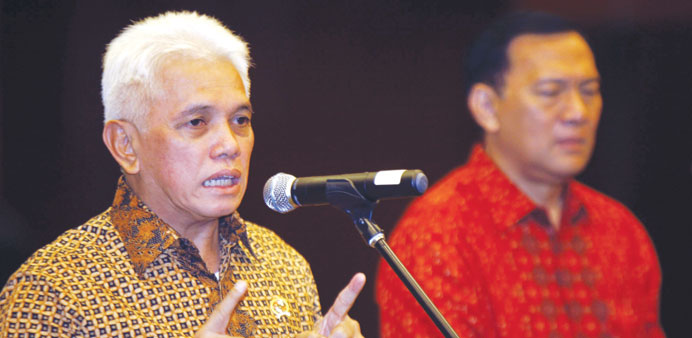|
|
Indonesia’s new acting finance minister pledged yesterday to stick with pro-growth, low-debt policies already in place, and gave priority to cutting a hefty fuel subsidy bill in a bid to allay fears of a spending spree before elections next year.
President Susilo Bambang Yudhoyono surprised many by giving Chief Economic Minister Hatta Rajasa, who has an engineering background, the additional role of finance minister last week, a job usually reserved for technocrats with strong economic or financial backgrounds.
The Jakarta stock market has eased slightly since Friday’s announcement, with many economists uneasy over Rajasa’s ability to implement key policy changes.
Rajasa, who has family ties to Yudhoyono, sought to ease those concerns, saying he planned to follow the fiscal measures of his predecessor Agus Martowardojo, who will take over as head of the central bank in late May.
“(I will) make sure that the 2013 state budget is safe and smooth, make sure that state revenue is safe and state spending is running well,” Rajasa told a news conference after being sworn in at the finance ministry.
Rajasa also said that he wanted to cut hefty government fuel subsidies and avoid deepening the fiscal deficits in Southeast Asia’s largest economy.
“The subsidy must be controlled and reduced for people who can afford it,” he said.
Rajasa is head of the National Mandate Party, a moderate Islamist party that is part of the ruling coalition, and there is speculation that Yudhoyono will back him to run for the presidency once he steps aside next year after a decade in power.
Some critics suspect the 59-year-old Rajasa, nicknamed the “Silver Fox” because of his hair, has been given the finance portfolio in order to control the flow of money ahead of next year’s legisaltive and presidential elections.
“The fact that Hatta Rajasa is not from the traditional pool of technocrats, the fact that he is a leader of a major party, and related to the president have created questions whether fiscal prudence will remain,” Fauzi Ichsan, senior Indonesia economist with Standard Chartered Bank.
Some analysts believed Rajasa’s close ties to Yudhoyono could prove a lightning rod for criticism. His daughter is married to one of Yudhoyono’s sons.
“Even if he means well, Hatta is a leader of a political party and a relative of the president so any major changes will create suspicions,” Standard Chartered’s Ichsan said.
In his first news conference as finance minister, Rajasa did not address foreign investors’ concerns over the government’s tendency towards more nationalist policies, especially as next year’s elections draw near.
“While investors overall remain optimistic that good policy will ultimately prevail, they remain cautious that, as in all democracies, politics may override good policy in the short term during the election cycle,” said Andrew White, managing director of American Chamber of Commerce. Despite those concerns, foreign investment remained robust, with inflows of $6.74bn in the first quarter, mainly bound for the mining, chemical and base metal sectors. Foreign direct investment was a record $20bn last year, helping fuel economy grow of 6.2% and shielding the balance of payments from a far deeper deficit.
Rajasa is Indonesia’s third finance minister in as many years, but it is unclear how long he will hold the post.

